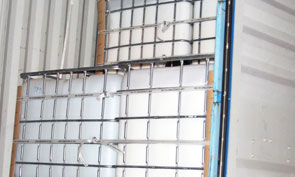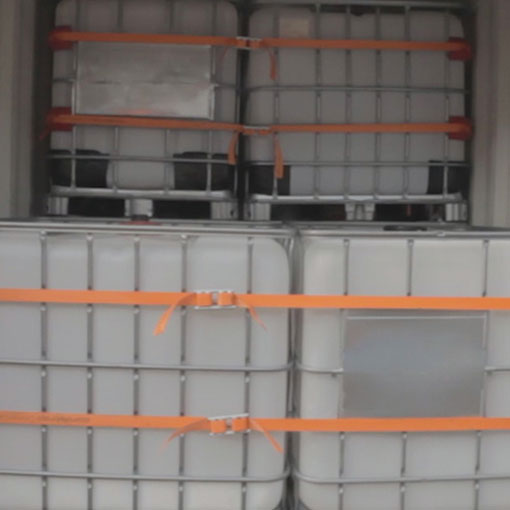
As manufacturer you want to make sure that you deliver a high quality product that meets your customer’s expectations. When talking to one of UK’s leading suppliers of minerals to the polymer and coatings industry who delivers his products across the world
the story was no different.
They contacted us after a customer complaint and
a near miss. An IBC’s had fallen from a container upon opening the door at arrival on the customer site.
They wanted to prevent this from ever happening again. As an interim solution they started using rope to secure the IBC’s unsure if this was a safe solution.
The minerals manufacturer had a clear requirement; How can we make sure this never happens again using
a solution that is quick to use and cost effective.
The company’s operators were a bit reluctant to add container securing as they never had to do this before. They were not aware of the CTU Code and thought the responsibility for that lay with the drivers.
We worked with the customer to find solutions that best fitted their need. A number of options were looked at leading to a container securing solution that was easy and fast to apply as well as being cost effective. In line with CTU Code requirements we created a good fall out protection solution that did not overstress the upper lashing points in the container. All operators were trained on how to apply the container securing solution and on the relevant aspects of the CTU Code. That helps them to do their job even better than before as they were made aware of their responsibilities and ensured the securing of containers was self- managing.

After a trial period the mineral manufacturer decided to implement this solution at their second site in the UK. The local staff was trained on how to apply the solution and CTU Code.
Both sites are now running CTU Code compliant and free of customer complaints about fallout from the container.
The lack in clear guidelines about how cargo should be secured in a good way and who is responsible for that leads to dangerous situations every day. Cargo, the environment and even human lives are at stake when cargo is insufficiently secured. For operators who are tasked with loading and unloading containers it is really important that cargo is secured properly so they can do their job in a safe way. The CTU Code, a joint publication of the International Maritime Organization (IMO), the International Labour Organization (ILO) and the United Nations Economic Commission (UNECE), is specifically designed to address these concerns.

Because of the added value of the CTU-Code, we notice an increasing global adoption. The Thai Terminal and Cargo Association for instance recently announced
only to accept containers that are secured according
to CTU guidelines. We also see an increasing number
of requests of both national as well international companies that want to conform to this new global standard.
Because Corporate Social Responsibility is high on the agenda of many companies, it is likely to assume that the CTU-Code will grow terrain over the next years.
For expert advice on cargo securing solutions contact us now
Contact nowCordstrap have specialists in over 50 global locations
Providing physical insurance to the world’s major industries
Delivering cargo protection solutions